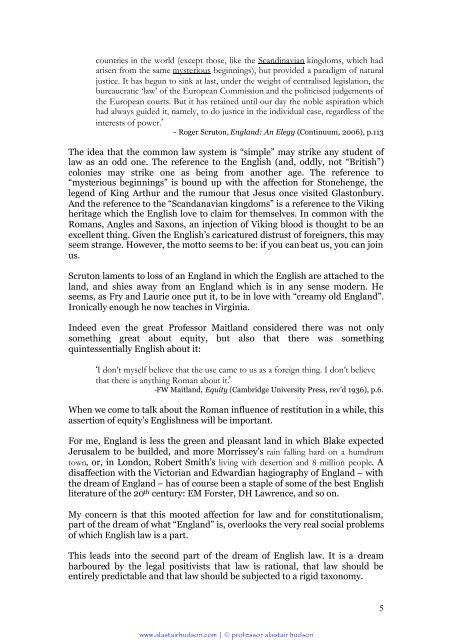England's dreaming equity, trust and conscience - alastairhudson.com
England's dreaming equity, trust and conscience - alastairhudson.com
England's dreaming equity, trust and conscience - alastairhudson.com
You also want an ePaper? Increase the reach of your titles
YUMPU automatically turns print PDFs into web optimized ePapers that Google loves.
countries in the world (except those, like the Sc<strong>and</strong>inavian kingdoms, which hadarisen from the same mysterious beginnings), but provided a paradigm of naturaljustice. It has begun to sink at last, under the weight of centralised legislation, thebureaucratic ‘law’ of the European Commission <strong>and</strong> the politicised judgements ofthe European courts. But it has retained until our day the noble aspiration whichhad always guided it, namely, to do justice in the individual case, regardless of theinterests of power.’- Roger Scruton, Engl<strong>and</strong>: An Elegy (Continuum, 2006), p.113The idea that the <strong>com</strong>mon law system is “simple” may strike any student oflaw as an odd one. The reference to the English (<strong>and</strong>, oddly, not “British”)colonies may strike one as being from another age. The reference to“mysterious beginnings” is bound up with the affection for Stonehenge, thelegend of King Arthur <strong>and</strong> the rumour that Jesus once visited Glastonbury.And the reference to the “Sc<strong>and</strong>anavian kingdoms” is a reference to the Vikingheritage which the English love to claim for themselves. In <strong>com</strong>mon with theRomans, Angles <strong>and</strong> Saxons, an injection of Viking blood is thought to be anexcellent thing. Given the English’s caricatured dis<strong>trust</strong> of foreigners, this mayseem strange. However, the motto seems to be: if you can beat us, you can joinus.Scruton laments to loss of an Engl<strong>and</strong> in which the English are attached to thel<strong>and</strong>, <strong>and</strong> shies away from an Engl<strong>and</strong> which is in any sense modern. Heseems, as Fry <strong>and</strong> Laurie once put it, to be in love with “creamy old Engl<strong>and</strong>”.Ironically enough he now teaches in Virginia.Indeed even the great Professor Maitl<strong>and</strong> considered there was not onlysomething great about <strong>equity</strong>, but also that there was somethingquintessentially English about it:‘I don’t myself believe that the use came to us as a foreign thing. I don’t believethat there is anything Roman about it.’-FW Maitl<strong>and</strong>, Equity (Cambridge University Press, rev’d 1936), p.6.When we <strong>com</strong>e to talk about the Roman influence of restitution in a while, thisassertion of <strong>equity</strong>’s Englishness will be important.For me, Engl<strong>and</strong> is less the green <strong>and</strong> pleasant l<strong>and</strong> in which Blake expectedJerusalem to be builded, <strong>and</strong> more Morrissey’s rain falling hard on a humdrumtown, or, in London, Robert Smith’s living with desertion <strong>and</strong> 8 million people. Adisaffection with the Victorian <strong>and</strong> Edwardian hagiography of Engl<strong>and</strong> – withthe dream of Engl<strong>and</strong> – has of course been a staple of some of the best Englishliterature of the 20 th century: EM Forster, DH Lawrence, <strong>and</strong> so on.My concern is that this mooted affection for law <strong>and</strong> for constitutionalism,part of the dream of what “Engl<strong>and</strong>” is, overlooks the very real social problemsof which English law is a part.This leads into the second part of the dream of English law. It is a dreamharboured by the legal positivists that law is rational, that law should beentirely predictable <strong>and</strong> that law should be subjected to a rigid taxonomy.5www.<strong>alastairhudson</strong>.<strong>com</strong> | © professor alastair hudson













